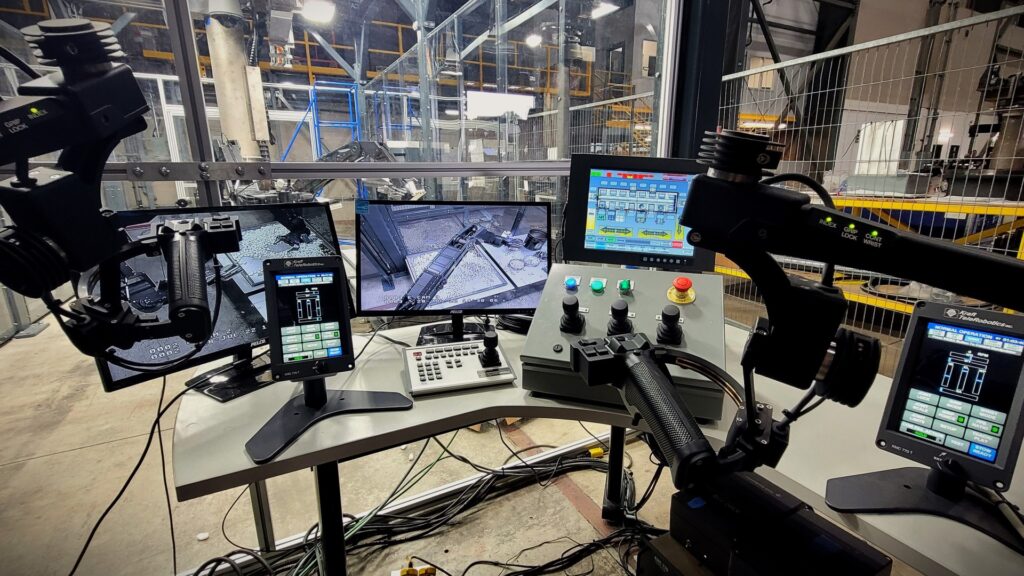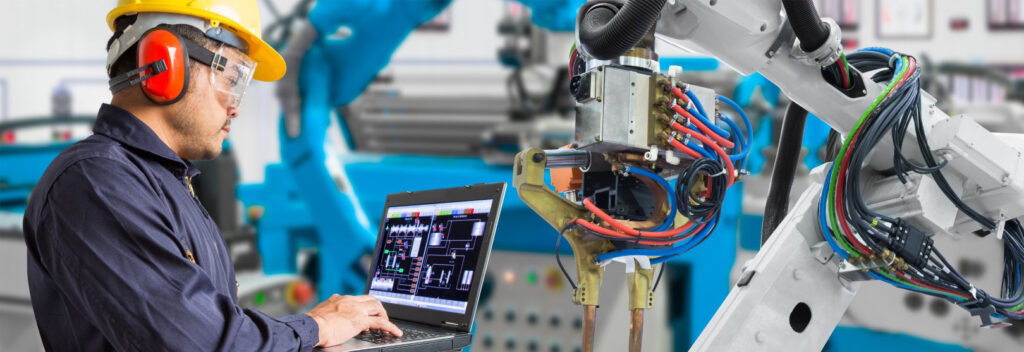How to achieve sustainability, safety, and resilience

In an era where sustainability, efficiency, and innovation are paramount, the energy industry is turning to automation to revolutionize its operations. Automation technologies are reshaping the way energy is produced, distributed, and managed.
Knowing how the benefits of innovation can positively affect a manufacturing plan can make a huge difference in a company’s willingness to commit. In this blog post, we’ll go over the specific benefits of automation in the energy industry; so that decision-makers can gain a full understanding of the multifaceted benefits of automation in paving the way for a more sustainable and resilient energy future.
Improved efficiency and output:
In general, machines work much faster than humans, meaning they will produce more energy in a fraction of the time. This equates to your business being able to increase its overall output significantly. Plus, if your automated machines use machine learning software, they will be able to find new ways to decrease production times, leading to even further improvements in efficiency. Given enough time, an automated system could theoretically cut production time in half, freeing up people and resources for use in other areas and further improving the efficiency of every part of your business.
Reduction in number of errors:
Of course, one thing that kills any amount of time saved during the production process is the time it takes to fix errors. Fortunately, a finely tuned automation system will produce far fewer errors than a human-run one. No matter how well you train your employees, mistakes happen. In the energy field, one small mistake can completely halt all power production, causing massive backups and delays. While automated systems aren’t infallible, they don’t make mistakes. Sure, they can malfunction, but these types of issues are less likely to occur than human-based accidents. Whenever accidents do occur in automated systems, it’s typically from the human-involved side of things, which you’ll still have control over.
Increased control of systems:
Speaking of control, though, automation is great at improving how much of it you have. Machines don’t slack off and always do what they’re told. People can be difficult to control. With proper training, it’s possible, but you still can’t keep an eye on everyone at once. Since automated machines need to run on the same system to function properly, you can also easily monitor and control them from a single computer. This level of accessibility allows you to know how well everything is running from one convenient place while providing you with crucial data that will allow you to make better business decisions.

Better adaptability to changes:
Once you have a hold on how your automated system functions, changing tasks and adapting to changes in workflow will become much easier. Not only can you see where your pain points are more clearly in your production line, but you can easily make changes that’ll benefit your output efficiency even further. Automated machines are quite adaptable; you can change the tasks they do after a simple reprogramming, as opposed to taking hours to teach an employee how to do something new. For businesses that change processes often, this can be an invaluable benefit, allowing you to adapt on the fly to keep up with needed energy outputs.
Prospect of predictive maintenance:
While machine breakdowns can be a new issue, certain advancements in technology are making this a much less significant pain point for companies who make the switch. Through advanced data gathering, automated machines can take better notes about how and why machines fail, making it easier for you to notice a problem before it becomes a critical issue. This means you’ll eventually hit a point where you’re fixing problems before they even exist, which will improve uptime and reduce overall costs. An energy company that can do this will be much more likely to keep power up and running more consistently while avoiding the annoying downtime that comes with breakdowns.
Enhanced regulation compliance:
In the energy sector, there are many regulations that companies must follow, especially in regard to the environment. Whether they’re federal or local guidelines, following them is critical if you want to avoid fines. Since automated machines have sensors and data analysis tools built in, it’ll be much easier to control your emissions, as well as any other outputs you need to regulate. On top of that, for energy companies that naturally have an environmental footprint, the increase in efficiency will naturally reduce the amount of waste you produce, making it easier to remain within your acceptable margins.
Superior cybersecurity:
Even though not all energy businesses use automation just yet, many of them have online systems that are prone to security attacks. Since the energy sector is a prime target for cyberattacks, it’s crucial to ensure you have the best cybersecurity possible. Fortunately, most automated systems are capable of having enhanced cybersecurity systems built into them. When electronics must communicate with each other wirelessly to work effectively, they need to ensure that this process can’t be easily interrupted by an unauthorized outside source. Still, even if a breach occurs, your enhanced data collection will make it easier to pinpoint the source of the intrusion and find the culprit from there.

Easier scalability:
While many of the benefits of automation in the energy industry are great on their own, the combination of all of them together leads to one of its strongest advantages: the ease of scalability. Since all these machines already work seamlessly together, all you have to do is increase the amount you have in order to boost output. That means using automation in renewable energy will make it much simpler to scale your business and reach new heights.
Boosted profit margins:
While it might be obvious by now, one of the best benefits to come out of a change to automated systems is the amount of money you’ll save. Even though switching to an automated system might be a bit costly upfront, the amount you’ll save in the long run will significantly boost your profit margins. It won’t take long to see these increases either. As long as you focus on improving your overall efficiency with these systems, you’ll see a return on your investment in no time.
The benefits of automation in the energy industry extend far beyond operational efficiency—they encompass safety, sustainability, and resilience. By embracing automation technologies, the energy sector is not only optimizing its current processes, but also laying the groundwork for a greener, more adaptable, and technologically advanced future. As the world continues its pursuit of sustainable energy solutions, automation stands as a key enabler in this transformative journey.
